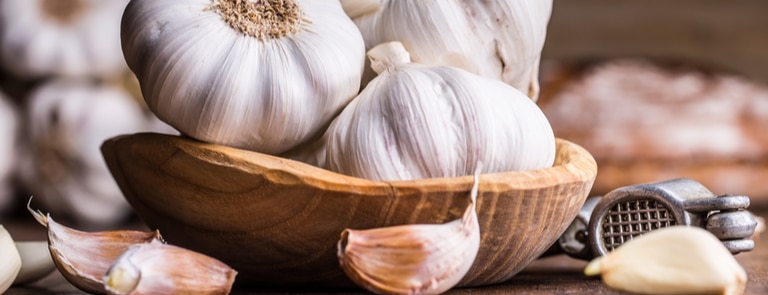10% off £30 OR 15% off £40
Garlic guide: Types & benefits

Not just for cooking, garlic has all sorts of uses and benefits. Keep reading to find out more!
What is garlic and what does it do?
Garlic is the edible bulb of a plant, which is part of the lily family, but it’s more than just a kitchen herb with a strong taste and flavour.1
In fact, garlic has been used in ancient civilisations such as Egypt, Greece and Rome.
Originally, garlic was used as a performance-enhancer and even given to the first Olympians in Greece, presumably to give them a boost.2
Nowadays, modern scientists agree that garlic is important for health.
According to the EU Herbal Medicines Agency, garlic can:3
- help prevent hardening of the arteries
- relieve symptoms of colds
Garlic is available as capsules. Some have been deodorised or have a coating to prevent giving your breath that tell-tale garlic odour.
What does garlic do in the body?
Garlic contains alliin, a compound that converts to a sulphur compound called allicin when it’s cut or crushed.
Allicin is considered one of garlic’s most important active compounds, and it’s what gives garlic that distinctive taste and smell.4 Scientists think allicin is antibacterial and anti-fungal.5
Research has found the following two effects of garlic in the body:
-
Help prevent hardening of the arteries
A 2013 Iranian study found that compounds in garlic, including allicin, can help prevent fatty deposits in arteries by:6
- reducing the amount of fat in the blood
- curbing cholesterol’s tendency to lay down fatty deposits in the arteries
However, other scientists have reported that the cholesterol reduction in the blood may not be significant.7
-
Reduce the length of a cold
Few scientific studies have looked into the effects of garlic on the common cold, but a 2001 study in Advances in Therapy reported that people taking garlic supplements were less likely to catch a cold, and also recovered faster if infected.8
A 2014 Cochrane review of studies reached the same conclusion, but said more studies were needed to confirm the results.9
What is black garlic?
You may know about the benefits of normal garlic, but what about black garlic?
Black garlic is simply an aged version of our favourite superfood, which may contain even more of the good stuff regular garlic does.
To make black garlic, fresh garlic is taken and fermented.
This process gives their cloves their dark, black colour and also makes them taste sweet and tangy – kind of like balsamic vinegar.
Some people love this as they want to enjoy all the benefits of garlic, but don’t enjoy that strong garlicky flavour it's famous for. The cloves also have a texture-change and feel jelly-like and chewy.
Although black garlic may seem like the new kid on the block, only really being seen in trendy restaurants and bragged about by foodies, it’s been around for much longer.
Asian countries like Japan, Thailand and South Korea have been using it for centuries – with each country having their own take on the fermentation process.
Most fermentation takes place in a warm, humidity-controlled environment where garlic is left for several weeks.
How it is fermented has an impact on its health benefits, which can include:
- Supports your immunity
- Keeps your heart ticking
- Benefits your brain health
- Helps stabilise blood sugar
Is black garlic better than white garlic?
We all know a garlic lover or two in our lives – you know, the ones who double the necessary cloves for every recipe!
And you’ll be pleased to know its benefits go much further than tantalising our taste buds.
Fresh garlic is hailed as a superfood thanks to its many health benefits.
Each little clove is packed with nutritious goodies like oligosaccharides, flavonoids, amino acids, and allicin – a sulphur compound that both gives fresh garlic its distinct smell and has been well researched for its health benefits.
Allicin is one of garlic’s most significant active compounds. The fermentation process of black garlic actually reduces the allicin content – which is why it's not so smelly.
To compensate, the process also creates a high concentration of an antioxidant called S-Allycysteine (SAC), which makes the remaining allicin more bioavailable.
In addition to this, the reduced allicin is converted into other antioxidants like bioflavonoids and alkaloids, which help to reduce the damage oxidative stress poses to our cells.
It’s official, black garlic is even more antioxidant-rich than white garlic!
Black garlic benefits
Now you know all about black garlic and how it differs to the fresh garlic we know and love, let's get into the benefits it can have for your health.
There is evidence from a large number of studies that both black and fresh garlic can have the following health benefits:
-
Supports your immunity
Black garlic is packed full of various antioxidants that help to fight free radicals and prevent oxidative damage to our cells.
In 2012, a study on the effects of black and raw garlic on the immune system was performed with 21 volunteers.
Black garlic had more beneficial antioxidant properties and an increased effect on the immune system.
Considering that plain old normal garlic is used to try and reduce the length of the common cold, makes black garlic’s increased antioxidant content even more promising.10
Handpicked content: 8 of the best vitamins to support your immunity
-
Helps your heart health
Animal tests have shown that black garlic can help to repair damage to muscles in the heart caused by lack of blood flow, aka, ischemia.
Another animal test was taken out in Korea which showed that black garlic can also reduce the risk of heart disease by lowering high levels of triglycerides and cholesterol.
Fresh garlic has also been seen to help prevent the hardening of the arteries by reducing the amount of fat in the blood and helping to curb cholesterol’s tendency to deposit fat in the arteries.11
Handpicked content: A guide to taking care of your heart.
-
Keeps your brain healthy
The high antioxidant levels in black garlic mean that it can help reduce the risk of some brain diseases.
Animal tests have also shown that is can help improve memory in cognition-impaired brains.12
Handpicked content: Best supplements to support brain and memory
-
Helps keep blood sugars stable
Several studies have looking to the effect black garlic has on blood sugar levels, especially when obesity and diabetes are present.
Evidence from animal studies suggest that it may be useful in preventing complications from diabetes and improving vascular and metabolic issues cause by a diet high in sucrose.13
Is black garlic for everybody?
Just like normal garlic, black garlic is seen as generally safe to eat and take for most people. In fact, when consumed in large amount, black garlic is usually better tolerated
However, garlic consumption can produce the following side effects in some people:
- heartburn
- gas
- nausea
- diarrhoea
- body odour
Some people may also be allergic, so watch out for asthma, skin problems or a runny nose after you’ve eaten it. If you’re concerned, stop consuming it and seek the advice of your GP.
Dosage: How much garlic is safe to take?
There is no reference nutrient intake (RNI) for garlic. However, it’s safe to consume at normal levels found in your food.14
If taken medicinally, 1-2 cloves of fresh garlic a day is safe.15
The European Medicines Agency recommends:16
- 900-1380mg of garlic powder per day for artery health, or
- 100-400mg a day for coughs and colds protection
The following groups should be careful of taking garlic supplements:17
- people having surgery within 7 days – there is a risk of bleeding after the operation
- children and young people under the age of 18 years – this has not been proven safe
- women who are pregnant or breast-feeding – garlic supplements have not been proven safe
- anyone taking certain medicines, in particular anti-coagulation or anti-platelet medication – garlic supplements may affect how quickly your blood clots, so speak to your doctor before use
What are the side effects of taking garlic supplements?
Some common side-effects include:18
- breath and body odour
- stomach pain and bloating
- headache and dizziness
- allergic reactions, such as contact dermatitis or conjunctivitis
- http://hsis.org/a-z-food-supplements/garlic-allium-sativum
- https://academic.oup.com/jn/article/131/3/951S/4687053
- https://www.ema.europa.eu/documents/herbal-monograph/draft-european-union-herbal-monograph-allium-sativum-l-bulbus_en.pdf
- http://hsis.org/a-z-food-supplements/garlic-allium-sativum
- https://www.ncbi.nlm.nih.gov/pmc/articles/PMC3874089/
- https://www.ncbi.nlm.nih.gov/pmc/articles/PMC3874089/
- https://nccih.nih.gov/health/garlic/ataglance.htm
- https://www.ncbi.nlm.nih.gov/pubmed/11697022
- https://www.cochrane.org/CD006206/ARI_garlic-common-cold
- https://www.ncbi.nlm.nih.gov/pubmed/11697022
- https://www.ncbi.nlm.nih.gov/pmc/articles/PMC3874089/
- https://www.sciencedirect.com/science/article/pii/S1021949816301727
- https://www.sciencedirect.com/science/article/pii/S1021949816301727
- https://nccih.nih.gov/health/garlic/ataglance.htm
- http://hsis.org/a-z-food-supplements/garlic-allium-sativum
- https://www.ema.europa.eu/documents/herbal-monograph/draft-european-union-herbal-monograph-allium-sativum-l-bulbus_en.pdf
- https://www.ema.europa.eu/documents/herbal-monograph/draft-european-union-herbal-monograph-allium-sativum-l-bulbus_en.pdf
- https://www.ema.europa.eu/documents/herbal-monograph/draft-european-union-herbal-monograph-allium-sativum-l-bulbus_en.pdf













